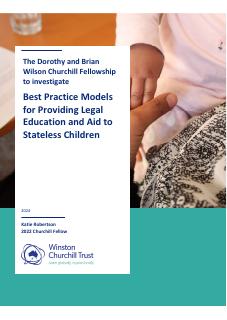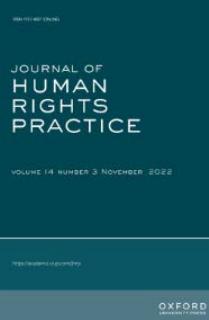“I can’t imagine what it will be like to be a citizen, but I’d like to find out before I die. I really want the sense of belonging.”
KEY ISSUES
- The UK has a statelessness determination procedure that can lead to a grant of a 5-year residence permit with a route to settlement and subsequent qualification to apply for naturalisation. However, applicants do not have a guaranteed right to stay in the UK, rendering them liable for removal and at risk of detention; and there are procedural and evidential hurdles that affect recognition as a stateless person.
- Stateless people lack access to facilitated naturalisation procedures, and the fee set for acquiring nationality is prohibitively expensive (including for stateless children). A fee waiver introduced in June 2022 is available for children for whom the fee is unaffordable, but it may be difficult for some to access.
- Successive changes to the law over the past 20 years have expanded nationality deprivation powers – increasing the scope of who can be targeted, re-introducing the possibility to render an individual stateless, bestowing more discretion upon the Home Secretary, weakening judicial oversight and eroding procedural protections.
STATELESSNESS IN THE UK
The UK is a state party to both the 1954 and 1961 statelessness conventions and introduced a statelessness determination procedure in 2013 that enables the grant of a 5-year residence permit (prior to that procedures regarding issue of travel documents, child registration and deprivation of nationality referred to the 1954 Convention definition of a stateless person). Nevertheless, there remain significant gaps in law, policy and practice that result in the failure to respect, protect and fulfil the rights of all stateless persons and every child’s right to acquire a nationality. Successive changes to the law over the past 20 years have expanded nationality deprivation powers, including by re-introducing the possibility to render an individual stateless.
Statelessness occurs predominantly in a migratory context in the UK. The government collects various data on the stateless population, including: those granted a residence permit (“leave to remain”) under the statelessness determination procedure, stateless people with other types of residence permit, who were born in the UK, or who are held in immigration detention. However, not all statistics are published and the data is not analysed or presented in a way that enables a full and accurate understanding of the stateless population in the UK. The UK census does not count stateless people and only asks what passport a person holds. UNHCR reported 4,547 stateless people in the UK at the end of 2023.
The UK’s statelessness determination procedure enables stateless people to have their status recognised and apply for leave to remain, and provides a right to work, homelessness assistance, student loans for tertiary education and free non-emergency healthcare as well as a route to naturalisation. People who have applied for a residence permit on the grounds of statelessness are in a non-suspensive procedure. In practice, there is no evidence of new decisions to detain nor remove them until a decision has been made on the application. People who are clearly at risk of statelessness but who have not applied for a residence permit are often subject to futile removal efforts and lengthy immigration. As such, stateless people do not enjoy the same protections as compared to applicants for asylum or complementary (“humanitarian”) protection, and there is also an absence of appeal rights, free legal assistance, and access to social and economic rights such as the right to work while awaiting determination of their status. Statelessness is also determined by officials trained to different levels in the contexts of: asylum procedures, the issuance of a stateless person travel document to those with a UK residence permit, the registration of stateless people as British, deprivation of British citizenship, detention and deportation.
Stateless people in the UK can face a number of human rights challenges that are directly linked to their lack of immigration status. These range from destitution and homelessness to a heightened risk of arbitrary detention particularly where procedural safeguards to identify and determine statelessness and related barriers to removal are lacking. Due to the lack of a time limit on detention they can be detained for disproportionate amounts of time. Laws introduced in 2023 and 2024 have considerably extended powers to detain and reduced judicial oversight of detention.
RIGHT TO NATIONALITY IN THE UK
Nationality Law in the UK is governed by the 1981 British Nationality Act and is a mixture of jus soli and jus sanguinis. A child born in the UK acquires citizenship at birth if at least one parent is a British citizen or is a permanent resident in the UK. Citizenship is acquired by descent if a child is born outside the UK to a parent who holds British citizenship by means other than descent (i.e. transmission of citizenship is limited to the first generation born abroad). British nationality law contains safeguards to prevent statelessness in the case of foundlings, adopted children and children born in the UK or abroad to British nationals if they would otherwise be stateless.
To access British citizenship under the special rules for stateless children, the law provides that the Secretary of State must be “satisfied” that the child is unable to acquire another nationality before they can register as a British citizen (stateless people aged 18 to 21 do not need to fulfil this requirement). The British Nationality Act provides in Sch.2 s3 that such children can apply to become a British citizen if they were born in the UK, have always been stateless, have lived in the UK for the last five years and have not been out of the country for more than 450 days in the five-year period. The entering into force of the Illegal Migration Act may affect this route to British citizenship for stateless children, if born to a person who entered the UK irregularly after 7 March 2023. While the Act does not explicitly bar such children’s applications for citizenship, if removal provisions are implemented, the Act could result in the removal of parents of stateless children born in the UK (and the children with them) who have not yet reached age 5 and thus not acquired British citizenship. Such families will potentially qualify for an exception from the application of the Act on human rights grounds, but many will likely struggle to find adequate legal advice. There are also other options for children to acquire British citizenship, not specifically for stateless children, but available to them. For example, children born in the UK may become eligible for citizenship if either parent become settled or naturalises, or if they live in the UK for the first 10 years of their lives, if other criteria are met.
Naturalisation is not facilitated for stateless people. Adults are eligible to apply for naturalisation after five years’ lawful residence and one additional year of permanent residence (regardless of the grounds for the residence permit), and must pay the same high fees as other applicants to acquire British citizenship. A 'good character' requirement is imposed, and there are citizenship and language tests, which can be waived in certain exceptional circumstances, but not on grounds of statelessness. Applicants for British citizenship face prohibitive application fees. However, as a result of litigation and related campaigning, a fee exemption was introduced for children in care in June 2022 and the Home Office policy is now to waive the fee where the applicant demonstrates the fee is unaffordable.
UK law, provides the Secretary of State with the power to revoke British nationality, including on national security grounds. These powers have been expanded through successive legislative amendments since 2002. In certain circumstances, deprivation of nationality is permitted even if this would result in statelessness.
DEPRIVATION OF NATIONALITY IN THE UK
Deprivation of nationality was first introduced in the UK with the British Nationality and Status of Aliens Act 1914, but was used sparingly. Its last known use in the 20th Century was in 1973. The Nationality, Immigration and Asylum Act of 2002 signalled both a legal and political shift: citizenship deprivation was made easier and the use of these powers increased over the course of the following two decades. The rules regarding nationality deprivation can be found in s40 of the British Nationality Act 1981. Under the legislation currently in force, naturalised British citizens can be deprived of citizenship even if this renders them stateless if they have acted in a manner “seriously prejudicial to the vital interests of the UK”, while dual British citizens can be deprived of citizenship if it is “conducive to the public good”.
The secrecy of deprivation proceedings on grounds of national security mean that exact figures for those have had their British citizenship taken away are difficult to determine. Nevertheless, it is estimated that at least 175 British citizens have had their nationality removed on national security grounds since 2006. Globally, in the period between 2000 and 2022, only Bahrain has been reported as targeting more of its citizens for revocation of nationality. This has led the UK to be described as a global leader in the race to the bottom when it comes to the resurgence of nationality deprivation.
Legislative developments allowing for easier deprivation of citizenship in the 21st century have often been implemented in the pursuit of certain individuals, such as David Hicks, Abu Hamza, and Al-Jedda, and fuelled by events such as the terror attacks in New York in 2001 and London in 2005. The interplay of the relative roles of the executive, legislature, and judiciary within the UK system have shown a cyclical pattern: the executive encounters an individual they want to deprive of citizenship but their attempt to do so is rendered unlawful by the courts. In response, the executive capitalises on national security fears to table and pass legislation amending deprivation rules to extend their power, rendering lawful the action the court had previously deemed unlawful. This process has been repeated over two decades, to deliver a steady erosion of the substantive and procedural safeguards in citizenship deprivation measures. The cumulative effect has been to expand powers, increase the scope of who can be targeted, bestow more discretion upon the Home Secretary in the use of nationality deprivation, weaken judicial oversight, and erode procedural protections.
After its defeat in the case of D4, the government introduced an amendment through the Nationality and Borders Act 2022 that removed the obligation to provide effective notice of nationality deprivation decisions under certain conditions. The impact being that a notification could be deemed effective if, as was the situation in D4, the notice was served by placing it in a drawer in the Home Office. This change has significant impacts on appeal rights. Those wishing to appeal a deprivation decision from outside the UK have 28 days in which to give notice under the Special Immigration Appeals Commission (Procedure) Rules 2003, starting from date when the notice of the deprivation decision is served, even if this notice does not actually reach the citizen who is being targeted.
STATELESSNESS DETERMINATION IN THE UK
The UK’s statelessness determination procedure leading to a grant of a residence permit is established under the Immigration Rules and the UK Government’s interpretation of the Rules is in its published guidance. Data is not regularly published on applications or decisions made on grants of residence permits, despite UNHCR’s recommendations. Detailed figures have been made available through Freedom of Information Requests. For example, between 1 January 2018 and 30 September 2021 a total of 3,244 applications were made; but only 232 people were granted a residence permit under the procedure and a total of 2,949 people were refused.
A dedicated and centralised Statelessness Team within the UK Government Visas and Immigration (Home Office) is responsible for examining all applications for a residence permit under the procedure (“statelessness leave applications”). However, the UK’s procedure falls short of UNHCR guidelines in a number of ways. The burden of proof rests with the applicant, rather than being shared. Decision-makers are obliged by government guidance to carry out research and enquiries, particularly where the applicant is ‘unable’ to do so and where the information available is lacking or inconclusive. However, an audit conducted by UNHCR, covering decision-making in the UK procedure between 2016-2019, revealed that some decision-makers fail to make efforts to investigate an individual’s nationality status, even when the applicant has already done everything they can to evidence their case. The standard of proof in the UK procedure is “balance of probabilities”, which is higher than in asylum applications. The procedure to request a residence permit applies to children without adaptation from the general procedure, and the burden of proof remains with the child. Moreover, the requirement to interview has been weakened in successive versions of the guidance for decision makers.
The UK’s failure to recognise statelessness as a protection issue means that for residence permit applications, there is neither a statutory right of appeal to an independent tribunal, nor free legal assistance in England and Wales (unless “exceptional case funding” is granted). Legal aid is available in Scotland and Northern Ireland. There is no timeframe for decisions set in law, and lengthy waiting times were highlighted in the UNHCR audit, which found that applications routinely take 18-24 months to decideIn 2019, the Committee Against Torture noted that individuals claiming statelessness status in the UK continue to be subjected to lengthy periods of arbitrary administrative detention, due to the UK’s cumbersome procedure for requesting a residence permit.
INTERNATIONAL COMMITMENTS
The UK has been a signatory to both the 1954 and 1961 Statelessness Conventions since 1959 and 1966 respectively. It maintains reservations to Articles 8, 9, 24, and 25 of the 1954 Convention (exemption from exceptional measures, provisional measures, labour legislation and social security, and administrative assistance), and Article 8 of the 1961 Convention (deprivation of nationality).
The UK has acceded to the CRC, CEDAW, CERD and CRPD, for which it maintains no reservations against the provisions relating to nationality. While the UK has acceded to the ICCPR, but maintains reservations against Article 24(3). The UK is not a party to the European Convention on Nationality. For more information on regional standards and intergovernmental commitments in Europe, see the StatelessHub Europe page.
- Click here to see what Recommendations the UK has received through the Universal Periodic Review
- Click here to see what Recommendations the UK has issued through the Universal Periodic Review
- Click here to see what voluntary pledges have been made by the UK
The content on this page was reviewed by Judith Carter, Solicitor and Lecturer at the University of Liverpool Law Clinic
[Last updated: December 2023]
Cover image by Matthew Daniels
VOICES & EXPERIENCES
-
The expansion of citizenship stripping powers in the UK
![uk 2]()
The expansion of citizenship stripping powers in the UK
![uk 2]()
“The Supreme Court affords a concerning level of deference to the executive on matters of national security and has in essence permitted a nationality deprivation order to remain unchallenged indefinitely, with the (former) British citizen impacted by the decision left in cruel, inhuman and degrading conditions and with no access to justice.”
Amal de Chickera
Co-Director of the Institute on Statelessness and Inclusion
There has been a remarkable increase in the scope and use of citizenship deprivation powers in the UK in the 21st century. The powers were used for the first time in 33 years in 2006. Since then, it is estimated that 175 citizens have been stripped of their nationality on national security grounds. Legislative developments allowing for easier deprivation of citizenship have often been implemented in the aftermath of events such as terror attacks (e.g. 9/11 and the 2005 London bombing) or following highly publicised cases of individuals linked to terrorism (such as Abu Hamza and Al-Jedda). This suggests a symbolic purpose to this legislation rather than a basis in purely security concerns. The cumulative effect of successive amendments has been to expand powers, increase the scope of who can be targeted, bestow more discretion upon the Home Secretary in the use of nationality deprivation, weaken judicial oversight and erode procedural protections.
Voices from https://files.institutesi.org/Instrumentalising_Citizenship_Global_Trends_Report.pdf
-
What it means to be stateless
![video]()
-
Long road to recognition for stateless people in the UK
![UK 1]()
Long road to recognition for stateless people in the UK
![UK 1]()
“I can’t imagine what it will be like to be a citizen, but I’d like to find out before I die. I really want the sense of belonging.”
Benjamin
Affected person
For more than seven decades, Benjamin lacked a nationality. Born in Namibia, then part of South Africa, he did not acquire nationality at birth because at the time neither of his parents had citizenship or permanent residency in the country. An opponent of apartheid, Benjamin was repeatedly incarcerated in South Africa before fleeing to the United Kingdom in 1973. He was detained briefly, requested asylum, but was released without immigration status. For years, he was afraid to regularise his status in the UK, fearing deportation to South Africa. During that time, he was unaware that he was stateless, but found that, over time, his lack of documentation made life difficult.
Voice from https://www.unhcr.org/news/stories/many-stateless-uk-face-tortuous-road-recognition
Latest Resources: United Kingdom
-

Blog: Deprivation of Citizenship - Updates
Type of Resource: News/ Media reporting / Blog
Theme: Nationality Deprivation
View -

The Dorothy and Brian Wilson Churchill Fellowship to investigate Best Practice Models for Providing Legal Education and Aid to Stateless Children
Type of Resource: Report
Theme: General / Other
Region: Europe
View -

Citizenship as a Privilege and the Weakness of International Law: The Consequences for Citizenship Deprivation in Bahrain and the UK
Type of Resource: Academic publication
Theme: Nationality Deprivation
Region: Europe
View



